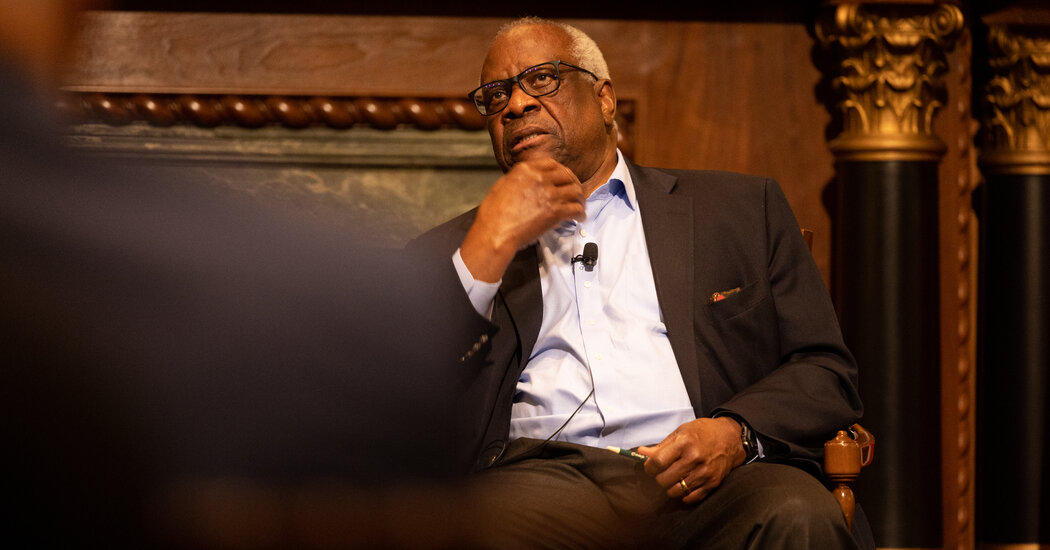WASHINGTON — Justice Clarence Thomas did not disclose that he had sold a series of properties to a longtime conservative donor from Texas in 2014, ProPublica revealed on Thursday.
The transaction is the first known instance of money going directly from the billionaire donor, Harlan Crow, 73, to the justice, in what appears to be a direct violation of disclosure requirements.
The revelation cast greater scrutiny on Justice Thomas, who has long raised eyebrows over questions of conflicts of interest, in part because of the political activism of his wife, Virginia Thomas. The nature of Justice Thomas’s relationship with the real estate magnate has elicited particular attention after ProPublica detailed last week how he accompanied Mr. Crow on lavish trips for nearly 20 years without disclosing them, including island-hopping in Indonesia and staying at Mr. Crow’s 105-acre lakeside retreat in the Adirondack Mountains. The disclosures have fueled calls by Democratic lawmakers and court transparency advocates for the justices to face tighter ethics constraints.
In 2014, a real estate company linked to Mr. Crow bought a single-family home and two vacant lots on a quiet Savannah street, paying $133,363 to Justice Thomas and his family for the property, ProPublica said.
Justice Thomas did not respond to a request for comment. In a statement last week addressing reports of his luxury vacations, the justice said he had been told that he did not need to report the hospitality of good friends.
“Early in my tenure at the court, I sought guidance from my colleagues and others in the judiciary, and was advised that this sort of personal hospitality from close personal friends, who did not have business before the court, was not reportable,” the justice wrote.
In a statement to The New York Times, Mr. Crow said the purchase was part of his “broader commitment to historical preservation and American education.”
Understand the U.S. Supreme Court’s Term
“My intention is to one day create a public museum at the Thomas home dedicated to telling the story of our nation’s second Black Supreme Court justice, who was born in Pin Point, Ga., and later raised in Savannah,” he said.
According to ProPublica, one of Mr. Crow’s companies bought the property from three owners: Justice Thomas, his mother and the family of Justice Thomas’s late brother. After the sale, contractors made a number of improvements to the property, where the justice’s mother still lived.
Advocates pushing for greater transparency at the court said the most recent revelation went well beyond typical social activities between friends.
Senator Sheldon Whitehouse, Democrat from Rhode Island, said in a statement that he would call on the policymaking body for the federal courts to refer Justice Thomas to the attorney general for potential violations of government ethics law.
“The Supreme Court justices are so deeply ensconced in a cocoon of special interest money that they can no longer be trusted to police themselves without proper process,” he said, adding that Chief Justice John G. Roberts Jr. should open an ethics investigation into Justice Thomas’s financial ties to Mr. Crow and his “apparent brazen disregard for disclosure laws.”
The net worth of Justice Thomas and his wife is unclear. What is known is pieced together from financial disclosures, which are filed by the justices. His disclosures did not list recent gifts, travel or the land purchase by Mr. Crow. Associate justices like Justice Thomas make an annual salary of $285,400. Chief Justice Roberts makes $298,500.
Ms. Thomas, who goes by Ginni, is well known for her conservative activism.
Her involvement in the push to subvert the 2020 election raised questions over whether Justice Thomas should have recused himself on Supreme Court cases related to the riot. Instead he participated in several cases involving Jan. 6 or the outcome of the 2020 election.
In 2011, the couple came under fire after Common Cause, a watchdog group, criticized the justice for failing to disclose his wife’s income, which was nearly $700,000 over five years at the Heritage Foundation, a conservative think tank. The justice then amended 20 years of filings.
More on the U.S. Supreme Court
- Uncomfortable Revelations: Democratic lawmakers reiterated calls to tighten ethics rules for the Supreme Court after ProPublica reported that Justice Clarence Thomas had accepted luxury gifts and travel from a major conservative donor without disclosing them.
- Trans Athletes: The Supreme Court issued a temporary order allowing a transgender girl to compete on the girls’ track team at a West Virginia middle school.
- A Constitutional Test: Two criminal defendants have asked the Supreme Court to decide whether testimony given remotely against them during the pandemic violated the Sixth Amendment’s confrontation clause.
The friendship between Justice Thomas and Mr. Crow dates to the mid-1990s, after Justice Thomas joined the court.
In 2004, The Los Angeles Times documented a number of gifts the justice received from Mr. Crow, including a Bible once owned by the abolitionist Frederick Douglass and a bust of Abraham Lincoln valued at $15,000.
Since then, Justice Thomas stopped reporting gifts and travel, but his relationship with Mr. Crow continued.
Mr. Crow helped finance a library project in Savannah dedicated to the justice. Initially, he anonymously gave $150,000 to renovate a Carnegie Library. It had been the only library in the city that welcomed Black people, and the justice has described the hours he spent there as a child.
In 2011, The Times reported that Mr. Crow had secretly poured millions of dollars into the purchase and restoration of a cannery in Pin Point, where Justice Thomas spent the first six years of his life. The town, in coastal lowlands, was a place where freed slaves built livelihoods by harvesting shrimp, oysters and crabs.
The cannery was transformed into the Pin Point Heritage Museum.
Mr. Crow has long had a foothold in conservative causes. He is a trustee of the George W. Bush Presidential Library Foundation and gave $500,000 to a group that sought to build public support for Mr. Bush’s Supreme Court picks. He also reportedly donated $500,000 when Ms. Thomas founded a Tea Party-related group several years ago.
Since 2006, Mr. Crow has also been a trustee of the Supreme Court Historical Society, a charity that asks for an annual contribution of at least $5,000 to preserve the court’s history and educate the public.
He also has invited the justice to gatherings at Camp Topridge, Mr. Crow’s private Adirondacks resort. A painting there, commissioned by Mr. Crow, shows the justice smoking cigars alongside Leonard A. Leo, a conservative force in pushing courts to the right; Mark Paoletta, a former assistant White House counsel who was a key player in Justice Thomas’s confirmation; and Peter Rutledge, a lawyer and former clerk to the justice.
















Leave a Reply